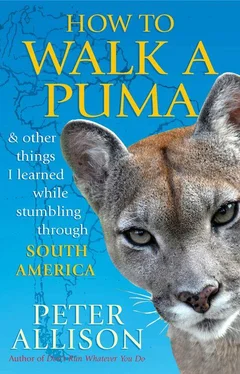‘Hey,’ Michael said, ‘that was excellent. But you can hear my breathing on the tape. Can you do it again, with a bit more energy?’
•
Over dinner that night, back at our hotel, Michael revealed that this was his first wildlife shoot, his usual work being studio based. It turned out he had shot several feature films I’d seen and enjoyed. Movies are a side passion of mine and we stayed up talking later than we should have given that another brutally early start was scheduled for the next day.
When I expressed concern at being tired for the next day’s filming, Michael assured me that if I could be as animated as I’d just been during our conversation we’d be able to nail it.
But there was no nailing. With no emotional feedback from the lens I came across as cold and emotionless as a toilet bowl, but nowhere near as deep. On day two we travelled to the lowlands, a place of tangled trees and busy streams, chattering with birds and monkeys. There might be jaguars here, but Michael, keen to get a worthy performance from me, kept calling for more energy, and by energy he meant shouty enthusiasm. If all the noise I made didn’t drive away the wildlife then the strange rictus I wore to show enthusiasm just might. Watching the playback I saw someone who looked like me but with a leery grin that would make sensible people lock up their daughters—and maybe bring Grandma in off the porch too.
Only when Michael took long shots of me seeing patches of the jungle for the first time did he capture my genuine love for all wild places, but the interspersed pieces to camera spoiled any useful footage he had.
The last segment was to be shot in a cave, which excited me because according to Diana it held five species of bats, including one with long fangs that drink blood. Vampires. I’d never seen them, and was keen for a close look.
‘Don’t forget, you need to project lots of energy!’ said Michael as we headed into the cave. Already that day I had climbed trees and a rock face to demonstrate that I was not a zombie, and while I did appreciate the opportunity being offered to me, suddenly the whole idea of appearing on screen was wearisome.
Yet real energy came to me when I met my first vampire bat. I’d read up on them in anticipation of this trip and knew they were unlikely to be dangerous—less than half of one per cent of bats carry rabies. (In fact, non-blood-sucking bats are more dangerous than vampires because their dung can harbour a fungus that causes a deadly lung disease.) Rising to my full height in the cave I came eye to eye with a roosting vampire and smiled in delight. My teeth are one of my more prominent features, and smiling at animals is generally a bad thing because showing your teeth suggests you are about to use them. The other bat species in the cave had taken off before I could get close, but the vampires all flashed their fangs straight back at my unintentional threat.
Unlike the other bats, vampires are able to run on the ground, an adaptation for their blood-sucking lifestyle. From the air they locate warm-blooded prey, such as a cow or even a sleeping human, land nearby, then walk towards it on their back legs and elbows before making incisions with their razor-sharp teeth and lapping at the flow of blood (unlike the creature of myth they are named after, they don’t suck blood—merely lick it). As they drink, their saliva mingles with the blood, releasing an enzyme with the truly wonderful name of draculin. This stops blood clotting, so the wound continues to bleed long after the bat has had its tablespoon or so of dinner.
While I had learnt all the above from my reading, I didn’t know that vampires can run while upside down, so when one abandoned its toothy threat display and scurried along the cave roof towards my face I was taken aback.
‘Hey!’ I said sharply, as if dealing with a cantankerous lion (and forgetting that this bat probably only understood Spanish). I’d always been taught not to run away from large animals, and had held my ground against lions, elephants, leopards and the like, but I instinctively took a step back from the bat, stones clattering at my heels, the sound reverberating in the cave. Loud enough to a human, the sound I’d made was possibly deafening to the four other bat species, who hunt using echolocation. They took off, several thousands of wings beating in the air and swirling around, the bats wanting to escape the noise without leaving the cave and facing the light. Despite this, they were so adept at using sonar not one collided with me in the maelstrom. The vampires, perturbed by the activity, joined the other species in the air.
Michael gave a not quite manly squeal as one of the vampires dive-bombed him, flying straight at the lens. Later he showed me the playback; while admittedly a bat approaching at speed is far more threatening in the widescreen he viewed it in, at the time his undignified exit from the cave was merely entertaining. He was okay, though, so I suggested we get back to work while I was still showing signs of life.
Re-entering the cave I heard Michael stumbling behind me. I understood it was difficult to simultaneously look through the camera and cover uneven terrain, and I had earlier kicked the stones myself, so I wasn’t frustrated until he said, ‘More energy, but move slowly!’
‘How?’ I said. The whole thing suddenly seemed so ludicrous that I burst out laughing. A startled bat devised a fitting punishment, lightening his load by relieving himself copiously onto my shirt.
For some reason I have always found the idea of monkeys defecating in their hands and throwing it at observers (not uncommon behaviour in zoos) wildly amusing, and even nicknamed one of my friends ‘Poo-monkey’, so perhaps what I’d received was a deserved double payback. However, monkeys eat fruit and bugs, which make disgusting enough droppings, but a diet of only blood makes for even nastier excrescences.
‘Oh man, that stinks!’ Michael said.
‘I’m just glad it wasn’t Robert Pattinson,’ I replied.
‘Hey man, that’s funny, say it again!’ said Michael, swinging the camera towards me.
Unfortunately, once more the moment was lost and my delivery was flat.
As the months went by, fewer and fewer emails came in from the company, and I knew that they would move on to other potential projects. I wasn’t offended and knew much of the blame lay with me.
Among what small disappointment I felt about it there was a nugget of delight. In the past I’d experienced failure by being a fool, but with television at last I’d found a field where I didn’t cut it because I wasn’t a big enough idiot.
Beekeeping in the Amazon

‘Honey, what did he say?’ the woman asked her husband loudly, even though the man she was referring to was standing right beside her and understood English.
‘He said it was to the left of the tree,’ her husband replied, not very helpfully as we were in the rainforest and trees were pretty plentiful.
‘Oh,’ she said, apparently satisfied. Then, mouth agape, she raised binoculars to her eyes and began a hectic scan—up, down, left, right and back—but the bird she was trying to see evaded her.
‘Darn it, where has it gone?’ she asked, though the bird hadn’t moved.
‘To the left of the tree,’ I said mischievously, able to do so because I wasn’t guiding this group—hadn’t been a guide for ten years in fact.
A man named Oscar was in charge of our group, and he’d been in the guide business for twenty straight years. The downturned lines set firmly into his face suggested he only smiled when paid to do so. I felt for him. There was nothing monumentally wrong with this group. They weren’t unpleasant. They weren’t overly demanding. They were just really irritating. Maybe I was prone to irritation because after eight months together Lisa had headed back to London, her year’s leave over, and I would not see her for another two months. In November I would visit her in the UK before carrying on with my South American journey.
Читать дальше













